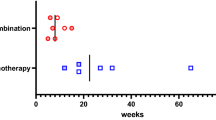Abstract
To evaluate the late-effects of allogeneic bone marrow transplantation (BMT) on endocrine function 20 adults (10 females, 10 males) with hematological malignancies were studied after a mean of 3.2 years (range 1.0–10.0) following BMT. The mean age of patients at the time of BMT was 39 years. Dynamic tests of the hypothalamic-pituitary axis included growth hormone releasing hormone (GHRH), gonadotropin releasing hormone (GnRH) and thyrotropin releasing hormone (TRH) stimulations with measurements of serum growth hormone (GH), follicle stimulating hormone (FSH), luteinizing hormone (LH), thyrotropin (TSH) and prolactin (PRL) responses. Adrenal function was assessed with the adrenocorticotropin (ACTH) test. Five patients (25%) had a subnormal GH response to GHRH stimulation, but all had a normal serum insulin-like growth factor I (IGF-I) value. There was an inverse nonlinear relationship between the body mass index (BMI; kg/m2) and GH response but no relation between the GH response and total body irradiation (TBI), intrathecal treatment or occurrence of graft-versus-host disease. In females, serum FSH and LH basal levels and responses to GnRH, in spite of oestrogen substitution therapy in 9/10 patients, indicated ovarian failure and early menopause. Most responses to GnRH were delayed. All males had elevated serum basal FSH levels indicating damage in seminiferous tubulus and infertility. Serum basal LH was elevated only in four males but testosterone values were all within normal limits. However, the mean free androgen index (FAI) was in the low normal range, and two subjects had abnormally low FAI. Serum free thyroxine (fT4) levels were normal in all but one, but an exaggerated TSH response to TRH occurred in seven patients (35%). Four of them had received TBI and one total nodal irradiation suggesting radiation-induced damage to the thyroid gland. In 19 of the 20 patients, adrenal function judged with ACTH test was normal. We conclude that functional impairments of the hypothalamus-pituitary-gonad/thyroid axis are common while disturbances in GH, adrenal and prolactin occur less often in patients after intensive treatment and BMT. Typically, the target organ is more commonly affected than the hypothalamus-pituitary axis. In spite of normal serum testosterone and LH values, serum FAI may reveal androgen deficiency.
This is a preview of subscription content, access via your institution
Access options
Subscribe to this journal
Receive 12 print issues and online access
$259.00 per year
only $21.58 per issue
Buy this article
- Purchase on Springer Link
- Instant access to full article PDF
Prices may be subject to local taxes which are calculated during checkout
Similar content being viewed by others
Author information
Authors and Affiliations
Rights and permissions
About this article
Cite this article
Kauppila, M., Koskinen, P., Irjala, K. et al. Long-term effects of allogeneic bone marrow transplantation (BMT) on pituitary, gonad, thyroid and adrenal function in adults. Bone Marrow Transplant 22, 331–337 (1998). https://doi.org/10.1038/sj.bmt.1701337
Received:
Accepted:
Published:
Issue Date:
DOI: https://doi.org/10.1038/sj.bmt.1701337
Keywords
This article is cited by
-
Prevalence of growth hormone deficiency in patients with unexplained chronic fatigue after undergoing bone marrow transplantation in adulthood
Journal of Endocrinological Investigation (2021)
-
Reproductive issues in patients undergoing Hematopoietic Stem Cell Transplantation: an update
Journal of Ovarian Research (2016)
-
Metabolic syndrome in hematologic malignancies survivors: a meta-analysis
Medical Oncology (2015)
-
Spätfolgen der allogenen Blutstammzelltransplantation
Der Onkologe (2015)
-
Diabetes mellitus among cancer survivors
Journal of Cancer Survivorship (2007)



